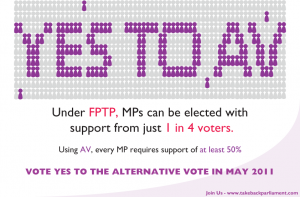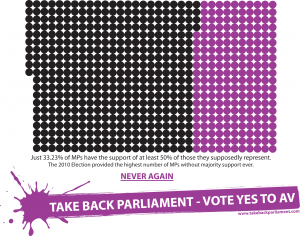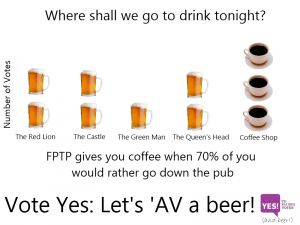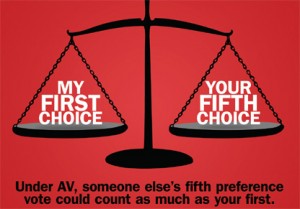It's referendum day in the UK: the day when all vote-registered citizens announce whether they are happy with the existing First-Past-The-Post electoral system, or whether they would prefer the Alternative Vote system.
Strong political divisions have emerged over the possibility of changing the electoral system in this way and, as usual, this has tended to overshadow the actual issue involved. Reforming an electoral system is a big deal and it almost seems like it's turned into a mud-slinging contest before it even left the ground. Still, that's politics.
The "No" camp in particular has released a significant volume of propaganda that seems to sidestep the issue somewhat, , whilst leaning on questionable logic:
The website no2av.org lists, as its reasoning, only scaremongering and sensationalism. Of course, this does not mean in itself that there are no good arguments against AV, but it does mean that the "No" camp hasn't used them, and instead has appealed to the electorate's common instincts with unexpanded rhetoric.
On the other hand, the "Yes" camp has been rather subdued, listing arguments well but doing so quietly. Without that sensationalistic "punch", it's a surprisingly mute campaign from a group fighting for such an extensive change: to reform the very basis of the UK's electoral system.
Yes to AV
Under a two-party system, First-Past-The-Post is great. You vote for your preferred candidate, other people vote for their preferred candidate, and from the results it's clear to see who's the most popular: whoever has the most votes wins.
Under the UK's multi-party system, however, it's not quite so simple. The winning candidate is the one with the most votes individually, but often the number of votes for the other candidates combined is greater than the number of votes for the winner.
The alternative vote claims to "fix" that by, when this scenario is detected at counting, redistributing votes from losing candidates based on voter-specified preference. Your vote will only ever count for someone that you stated you have at least some preference for, and if, say, your first choice is not counted then it doesn't really matter because that candidate was never going to win anyway.
In practice, it's a superior system that promises to be fairer and more representative.
From the "no" camp, the oft-heard assertion that "FPTP has worked well for centuries" is a strange one. The electorate consistently votes centre-left, yet the Conservative party has dominated UK politics for two-thirds of the time since 1900. Only twice in that entire century – 1900 and 1931 – did the Tories actually win a majority of the votes.
Likewise, the oft-heard assertion that "we should keep FPTP because only a handful of countries have adopted AV" is also logically unsound, without some metric with which to determine just how successful the electoral system has been in those that haven't. The US is not relevant as a two-party system is a different beast altogether; and are we really going to assert categorically that all those other FPTP countries have the optimal system?
No to AV
On the other hand, it may be unsavoury in principle that your fifth preference vote may end up bearing as much weight on an election as somebody else's first preference vote.
It's also a concern that (again, in principle) employing a system of elections that — and I mean this with the greatest of respect for my fellow countrymen — many people in the UK will not fully understand might not be entirely appropriate. Do we maintain a slightly broken system that everybody understands, or introduce a fairer system that nevertheless may (perhaps) lead to some people not really knowing what they're voting for?
The anxiety of some predicting electoral candidates watering down their policies to pander to the whims of potential second- and third-preference voters is also palpable. Though on the surface it may seem like a good thing that candidates should have to really impress (rather than simply shoring up their existing followers), we could end up with several candidates whose stated policies aren't really all that dissimilar. And, as any business competition lawyer will tell you, variety in choices is a good thing.
In particular, candidates for major parties may be tempted to pander to followers of minority parties more than usual in order to solicit their Nth-preference votes. In the worst case, this might involve BNP-friendly policies creeping into centre-right candidate policies. In practice, considering the extremity of this specific example, it's unlikely to become a tangible problem; however, it is a fundamental flaw.
Conclusion
Neither way is perfect. Both have their flaws. Democracy and society aren't perfect; we just have to accept that.
First Past The Post is non-representative but relatively simple, and aligns with our instincts of how a race "should" work. Clinging on to FPTP merely under the illusion that it already works perfectly is silly, but it may still be the best of two options.
Alternative Vote is fairer and mathematically superior, but is significantly more abstruse and may embody some moral quibbles as to whether an electorate who doesn't understand the voting system is really any fairer, in balance.
Make up your mind and make your vote. The referendum had to be fought fairly hard for and, whether you want to keep FPTP or you want to give AV a go, make your opinion known.
Bootnote
It's worth giving this article a read. It's like this one, but better-written.






